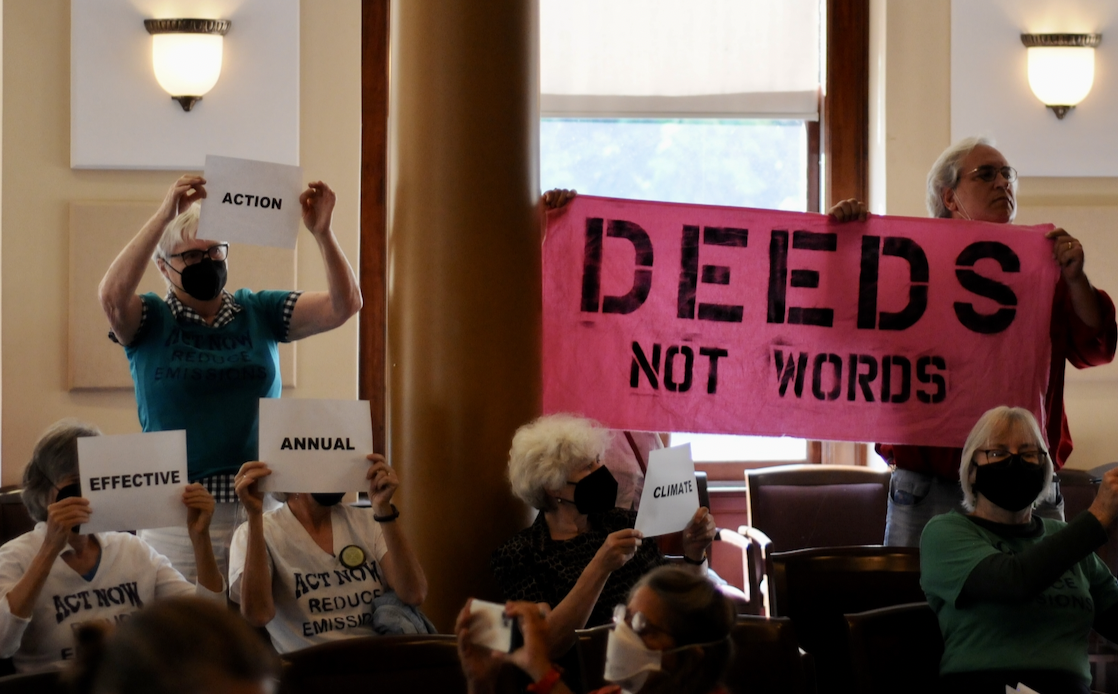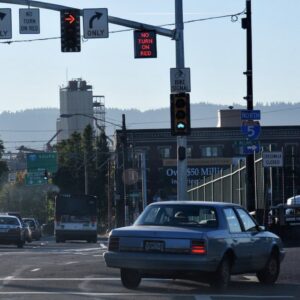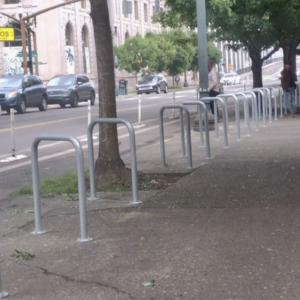
“The only way meaningful change will happen is through governmental regulation (like california banning gas cars) or major business/ structural economic change.“
Welcome to the Comment of the Week, where we highlight good comments in order to inspire more of them. You can help us choose our next one by replying with “comment of the week” to any comment you think deserves recognition.
Our Activists want ‘Deeds not words’ as Portland adopts climate work plan post garnered a curious thread of comments. Several of the first comments to arrive criticized the age of the activists—as if global warming is a crisis about which only those under a certain age have the right to an opinion. (I eventually removed some comments for being ageist.)
Another chunk of comments seemed almost to celebrate the demise of downtown. Or framed another way, to celebrate the age of decentralization that working from home is maybe ushering in.
It was toward that second batch of comments that commenter “was carless” took aim with a strongly-worded rebuttal.
BikePortland doesn’t fact-check comments, but we also don’t want to amplify false information. So I did some cursory fact-checking of the “was carless” comment using the 2022 International Panel for Climate Change report, the EPA GHG emissions by sector information, and Carbon Brief’s summary of the IPCC report. The comment was consistent with what I read from those sources.
(“was carless” might be incorrect about personal transportation being 25% of US emissions, my reading of the EPA reports is that it is less than that, possibly as low as 13%. That only strengthens “was carless’s” argument.)
Here’s what “was carless” wrote:
Greenhouse gas emissions in the US are overwhelmingly NOT from the personal transport sector, which only comprises about 25% of emissions.
The rest of emissions [are] from from these sectors:
– electricity generation (so anyone posting on the internet or using web services is part of the problem)
– industrial emissions including resource extraction and steel/concrete production. Nothing you do will ever impact this
– heating and cooling buildings. Office buildings are 3-4 times more efficient than people working from home
– Air travel & international shipping
– Methane and co2 releases from agriculture
Almost every poster in this thread is tilting at windmills. Your personal co2 emissions from driving 15,000 miles a year in a 10 mpg pickup truck would be 15 tons annually.
Global emissions are at 36.3 billion tons. Your personal impact from driving is 2.75 x 10^-10.
Or 0.00000000275% of global emissions
if every Portlander stopped driving that would still only be 0.000062% of global emissions.
So we absolutely need to reduce our greenhouse emissions, but shaming people to avoid driving to ride bicycles in an unsafe environment is not the way. Claiming that all office work needs to be done at your personal home, which costs more energy to heat and cool than an office building also isnt the solution. And in fact, is a non solution to anyone living in a small or studio apartment or has children.
The only way meaningful change will happen is through governmental regulation (like california banning gas cars) or major business/ structural economic change. Ie, shutting down the coal power plants and installing wind, solar and city sized battery systems. Switching from fossil fuel to hydrogen or ammonia fuel for shipping and aviation. Etc.
Everything else is just a distraction and is the worst form of performative virtue signaling.
Thank you “was carless!”
“Was carless” left off an important point that “Soren” made in his GHG and Drunken Sailors “comment of the week” from four months ago. An out-sized share of our carbon footprint in Multnomah County (as in other wealthy cities) is “demand-side.” We consume a lot, so a significant portion on our GHG impact is not our direct GHG emission, but rather he GHG released in all the places around the world that produce what we consume.
You can read “was carless“and the whole thread, under the original article.








Thanks for reading.
BikePortland has served this community with independent community journalism since 2005. We rely on subscriptions from readers like you to survive. Your financial support is vital in keeping this valuable resource alive and well.
Please subscribe today to strengthen and expand our work.
I don’t necessarily agree with the ideas expressed in every “comment of the week” we select, but in this case I agree with what “was carless” is saying.
My impression of many comments in this thread is that folks are not addressing the main point of the comment—that government has a large role/responsibility in combating climate change.
Individual virtuous choices are great—good for you! But if you think about it, the selection of choices available to you is often the result of government policy.
The selected comment was responding to a post about a group of older people lobbying local government to take stronger action with climate policy. “Was carless” is supporting that type of effort by pointing out that governments are capable of actions which have a bigger effect than the virtuous decisions of even a collection of individuals.
Don”t leave out methane release from melting permafrost, especially in Siberia. Millions of times more deadly than vehicle emissions worldwide. Also, release of GHG from ancient ice melt in Antarctica.
What’s bad about cars is the noise and congestion they cause.
This kind of comment is misguided in the extreme. MC already did a full and comprehensive rebuttal of “was carless”s misguided nonsense, but I’ll just add that this is a chicken and egg problem. Cars are at odds with cycling, plain and simple. Every concession to driving makes biking more dangerous. Riding a bike helps normalize more bike riding, setting an example, and creates justification for further bike infrastructure.
The whole blame avoidance by saying “my personal car isn’t >50% of the problem therefore shrug” is just lazy. The single biggest impact you can have personally on climate change, well that’s probably not eating meat. But besides that, it’s not driving your damn car. And it has way more impact than simply the tailpipe emissions. Things like the steel production “was carless” mentioned. What do they think cars are made of?
Of course climate change won’t be solved by your personal choices but stop using that as a rhetorical shield to doing the right thing.
Without cars and trucks, we wouldn’t have an elaborate system of paved roads, and we’d all be on mountain or gravel bikes. Which might suit many folks fine.
Wow, the most original of original arguments!
No kidding, everybody knows you need *trucks* (not cars btw) to build infrastructure. But they’re not the thing clogging up every highway and barreling down every stroad in suburbia making it actively harder to do anything other than drive a car.
Some of the earliest, most vocal, and influential advocates for paved roads were cyclists.
https://www.google.com/amp/s/www.vox.com/platform/amp/2015/3/19/8253035/roads-cyclists-cars-history
Don’t forget about land use change. Cutting down more forests to build more strip malls, with more highways that use many tons of gravel, etc. to facilitate car use is actually a huge GHG impact. None of these things are going to fix the problem. It’s a yes, and type of problem, not an either, or.
Maybe the point is quit trying to guilt trip everyone as you aren’t going to win over people by telling people that they are evil spawn for driving.
But if you take the tact of “we’re in this together”, “do what’s right”, or something similar (I don’t claim to be able to create catchy catch phrases) you might be able to win over people 1 less car trip and 1 less steak at a time.
Yeah, maybe, and I know it’s hard not to just get straight up angry and bitter at every SUV driver. I know that’s not helpful. But I also don’t think anyone is seriously thinking that it is helpful.
The reality is electric cars aren’t going to get us out of this mess. Mostly nothing will, but at the very least a sustainable way of living that doesn’t rely on cars is one part. Doing nothing and saying “well I’m not the worst offender” just doesn’t seem like a comment worth highlighting.
“0.00000000275% of global emissions”
This is a poor framing and misunderstanding of collective action. It’s sort of Zeno’s paradox failure.
The same sort of argument could be made about voting, wherein a single vote, by itself, is very rarely likely to change an election, and is a tiny part of the total.
Yes, the climate crisis is a global crisis, with billions of actors and actions, but our actions inspire other actions, and collectively – each of us acting individually – can create a difference.
If we boil it down to its essence, the argument is basically “There are 8 billion other people on this planet, so why bother doing anything about anything?”
Exactly. It’s like any time people complain (and they always do) about Portland doing something to reduce emissions, saying Portland is just a tiny emitter to begin with. Or why should the United States do anything, when China emits more than us!? (of course ignoring the complete irony that China emits GHG to manufacture and ship garbage to us to buy from Amazon).
The right winger President we have who is just like Trump just passed a significant 300 billion climate bill…..There are people trying to alleviate the problem but its never enough for someone who just plain doesn’t want to acknowledge it.
What country is trying to do more?
Finland, Iceland, the Netherlands all have almost as many cars per person as the US does.
You Utopia exists only on the internet.
You are correct, it is never enough. Nobody is doing enough. It is yet to be seen if this current climate adjacent legislation will have significant benefits, or if the oil drilling it opens the gate for will cancel out any good it does. Who knows. And who cares? This isn’t the first time Democrats have had control of any amount of government and known about the dangers of climate change. They are just as guilty for getting us here and I don’t care that just now there is something that (might be) worth a slight “good job”. Whoopty doo. A little late.
They deserve criticism. The whole time, because yes, this is not enough so we have to keep pushing for more.
But this is besides the point. This thread is about how people complain when *something* and argue for nothing to be done instead.
So, in this analysis (which I generally agree with), it’s the inspiration of others rather than our individual actions that are important. That is, if I can convince 100 of my Twitter followers to eat a vegetarian diet, I’ve made my impact, and I can enjoy my steak guilt free.*
*Hypothetical example; I am, in fact, mostly vegan, and don’t do Twitter because Twitter and meat are both moral cesspools and are destroying the larger world (in that order).
What I find amazing is all the different threads on BP of readers’ faith in government regulation and then in the next thread, their condemnation of this or that regulation that isn’t being enforced, and a few threads later, how unjust many of our regulations are.
Every time I visit Canada, I’m reminded of how we Americans have a certain unmitigated contempt for any sort of centralized government, be it federal, state, or local, and how our Canadian cousins love their government institutions.
Our country was “founded” by a bunch of over-privileged rich white slave-owners (from throughout the 13 colonies) and slave-profiteers (mostly from New England) who fought a protracted rebellion (civil war) against their United Empire American brethren and their fellow crown forces. Our “patriots” fought for life and the liberty to keep other people in slavery, while the crown went around freeing slaves (blacks, Indians, and whites) and then recruiting them into the crown forces. In 1768 a British judge found that there was nothing in the British constitution that supported the institution of slavery, so you can perhaps understand why American slave owners like Jefferson and Washington and slave profiteers like Adams and Hancock where so intent in rebelling at all costs – they could see the writing on the wall, that Parliament would soon regulate then ban slavery everywhere. And they did – imports and shipping was banned by 1809, slavery by 1826 even in their colonies – and it was replaced with the dark satanic mills, landless tenants, debtor prisons, and poor houses instead.
The only way we Americans will collectively respond in a progressive way to climate change and reducing our greenhouse gas emissions is if it is
A. Fun; and
B. Convenient; and
C. Profitable.
Forget about self-interest, self-preservation, survival of the species, and all that balderdash – we don’t care – we’re Americans.
If New Englanders were fighting for the preservation of slavery, why did they abolish it when they became independent of the British, who hadn’t abolished it? If all the colonies were fighting to preserve slavery, why was there even a debate (and ultimately a compromise) about it at the constitutional convention?
Because David’s presentation of history is utterly distorted, as is the style these days.
Only Vermont abolished slavery upon statehood, the other northern states gradually abolished only after the trade in imported slaves was no longer profitable, after the British Navigation Acts of 1807-9 more or less prohibited it, and particularly after the War of 1812 which ended in 1814. The northern and New England merchants profited in the trade in slaves but the local economy wasn’t dependent on them – most slaves bought by northern business people were sold to southern plantations, at a huge profit I might add. With the loss of the slave trade, many shippers had to turn to exporting manufactures or to whaling (think Moby Dick.)
The US constitution didn’t abolish slavery until the 1860s.
Having a new religion might help.
For all the fashionable denunciations of the founders of nation who were insufficiently anti-slavery, there are plenty of folks right here (and I probably mean you, dear reader) who happily buy products or eat food produced with slave or slave-adjacent labor. You literally pay to support the practice.
So David is right: We love to accuse those in the other tribe of the most heinous of crimes, but when it comes to our own, many of us are rank hypocrites.
This type of argument has no benefit and I believe it’s ultimately harmful. People see these statistics and pat themselves on the back for driving thinking, “it’s not me, it’s the evil corporations that are doing all the polluting.” It’s like if these other industries were dumping many barrels of waste into a river every day and you threw a candy bar wrapper in the river every day. It’s not nearly as much as the other industries are polluting, but you still decided to do it.
Automobile use in urban areas also has a major impact on our health (https://www.hsph.harvard.edu/news/press-releases/decreased-vehicle-emissions-linked-with-significant-drop-in-deaths-attributable-to-air-pollution/). You can say automobile emissions have a very small effect world-wide but in saying that you are downplaying the direct health effects they cause on the local scale.
There’s also this study from NASA (https://www.nasa.gov/topics/earth/features/road-transportation.html) which found that though, cars didn’t emit the most pollution, the type they emit causes a faster increase in global warming compared to other industries. This is because a part of the pollution emitted by other industries actually have a cooling effect but reflecting the sun’s rays in the atmosphere.
Those are two great reads. I thank you. Too bad so many people “don’t look up”
Oh good. I’ve had my eye on a Hummer H2 for a while, and now I’ll go out and buy it, since my personal transportation choices don’t really matter.
Good work, Lisa!
The fact that you can even think about driving a hummer on public streets is because of (lack of) government regulation.
The fact that you can even think about riding a bike on public streets is because of (lack of) government regulation.
That’s the nature of a living in an “things are generally allowed unless prohibited” kind of society.
I am confused by your comment. All vehicles are subject to several regulations, both federal and state. Now you might be projecting your personal belief that its too big. An H2 is nothing more than a Chevy Tahoe in different sheet metal. Of course you might be confusing it with it’s bigger brother the H1. Of course as vehicles go its not large. Most of you think that large non-commercial vehicles are only found in the US. So follow the link to see a large vehicle from you will find on European roads.
Unimog camper provides unlimited mobility. (mercedes-benz-trucks.com)
Hi Jim, I don’t want to get pulled into commenting about a specific car, I was just using Fred’s example.
You’re right, vehicle design is subject to lots of regulations. If issues of pedestrian safety and global warming move up in priority, they could be subject to many more regulations. And government regulation would have a stronger effect than individual consumer choices.